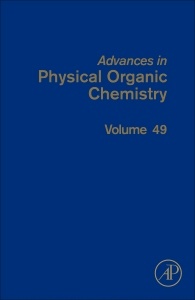Description
Advances in Physical Organic Chemistry
Directors of collection: Williams Ian, Williams Nick
Language: English
Subjects for Advances in Physical Organic Chemistry:
Keywords
Amides ureas; Biodiesel; Biofuels; Biological catalysis; Carbamates; Carboxylate esters; Chemical kinetic mechanisms; Combustion; Decarboxylation; Ethanol; Ethanolysis; First generation; Kemp elimination; Large rate accelerations; Leaving group assistance; Lewis acids; Lignocellulose; Metal ion-promoted catalysis; Methanolysis; Oxygenates; Phosphate esters; Phosphoryl transfer; Radical polymerization; Radicals; Second generation; SN2; Solvent effect; Stereocontrol; Sulfuryl transfer; Third generation
Support: Print on demand
Description
/li>Contents
/li>Readership
/li>Biography
/li>Comment
/li>
Advances in Physical Organic Chemistry series of volumes is the definitive resource for authoritative reviews of work in physical organic chemistry. It aims to provide a valuable source of information not only for physical organic chemists applying their expertise to both novel and traditional problems but also for non-specialists across diverse areas who identify a physical organic component in their approach to research. Its hallmark is quantitative, molecular level understanding of phenomena across a diverse range of disciplines.
1. Metal Ion Promoted Leaving Group Assistance in the Light AlcoholsR. Stan Brown2. Medium Effects in Biologically Related CatalysisMarcello Forconi3. Combustion Pathways of Biofuel Model Compounds: A Review of Recent Research and Current Challenges Pertaining to First-, Second-, and Third-Generation BiofuelsCarrigan J. Hayes, Donald R. Burgess, Jr. and Jeffrey A. Manion4. Mechanistic Perspectives on Stereocontrol in Lewis Acid-Mediated Radical Polymerization: Lessons from Small-Molecule SynthesisBenjamin B. Noble and Michelle L. Coote
Researchers at all levels and in all sectors who need access to definitive reviews of topics requiring a quantitative, molecular-level understanding of chemical phenomena
Nick Williams has been Professor of Physical Organic Chemistry at the University of Sheffield since 2011. He has many years experience in experimental studies that are focused on understanding mechanism and reactivity in organic chemistry. He studied for his first degree at the University of Cambridge, where he stayed for his PhD under the supervision of Tony Kirby. After a further short post doctoral period and a position as temporary lector in organic chemistry at Trinity College, Cambridge, he spent two years at McGill Univ
- Reviews the application of quantitative and mathematical methods to help readers understand chemical problems
- Provides the chemical community with authoritative and critical assessments of the many aspects of physical organic chemistry
- Covers organic, organometallic, bioorganic, enzymes, and materials topics
- The only regularly published resource for reviews in physical organic chemistry
- Chapters are written by authoritative experts
- Wide coverage of topics requiring a quantitative, molecular-level understanding of phenomena across a diverse range of disciplines




